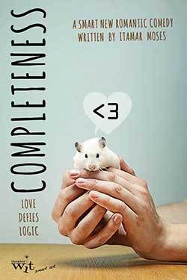PARADOXICAL DUALITIES
It’s brainy almost beyond endurance and savvy in its approach/avoidance strategies of gaming love. Happily, Itamar Moses’ Completeness at Theater Wit is also engrossingly directed by Jeremy Wechsler as it chronicles a complicated, captivating relationship between two scientific searchers, Elliott and Molly. Easily and perversely, they can reason themselves out of what they want most. Will these born learners discover the art (not science) of forgetting what hurts to grasp what helps?
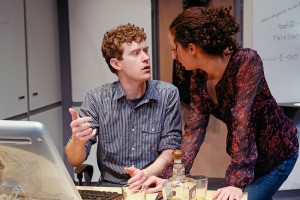 It all starts at a chance meeting that proves fateful only in consequence, not in origin, at a computer cluster in a university library. A glancing interaction leads to cooperation, collaboration and finally congress between Elliott (Matt Holzfeind, as silly as supple), a computer-science geek, and grad student researcher Molly (Kristina Valada-Viars, as vulnerable as astute), a molecular biologist working on a daunting cross-departmental experiment on cell regeneration in yeast cultures. Garrulously chatting, the red-headed tech genius devises a data-mining algorithm to speed up her studies. Impressed by his instant mastery of her intellectual needs, Molly is drawn to this conditionally confident Elliott. He’s a very nice nerd.
It all starts at a chance meeting that proves fateful only in consequence, not in origin, at a computer cluster in a university library. A glancing interaction leads to cooperation, collaboration and finally congress between Elliott (Matt Holzfeind, as silly as supple), a computer-science geek, and grad student researcher Molly (Kristina Valada-Viars, as vulnerable as astute), a molecular biologist working on a daunting cross-departmental experiment on cell regeneration in yeast cultures. Garrulously chatting, the red-headed tech genius devises a data-mining algorithm to speed up her studies. Impressed by his instant mastery of her intellectual needs, Molly is drawn to this conditionally confident Elliott. He’s a very nice nerd.
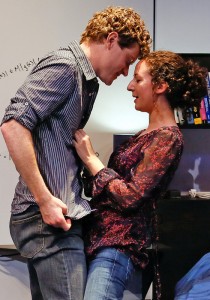 Of course, each potential lover has a back story to overcome, deny or ignore. Elliot reflexively breaks up with undergraduate Lauren (Rae Gray, versatile in three roles) who leaves when she realizes that she can’t control this “intellectual property.” Molly in turn is subtly harassed by a jealous anti-mentor (Andrew Jessop, who also depicts the enthusiastic colleague who lends her his precious mice for experimentation).
Of course, each potential lover has a back story to overcome, deny or ignore. Elliot reflexively breaks up with undergraduate Lauren (Rae Gray, versatile in three roles) who leaves when she realizes that she can’t control this “intellectual property.” Molly in turn is subtly harassed by a jealous anti-mentor (Andrew Jessop, who also depicts the enthusiastic colleague who lends her his precious mice for experimentation).
Theirs must be the most cerebral courtship ever staged: Thinly concealing their longings under the ferment of scientific banter, Elliott and Molly finally collapse into sex, the perfect excuse for not talking a mile a minute (yes, there’s full nudity). But in their many non-sexual moments, both partners are beset by the maddening uncertainty of love and how to test it. Too clever for any easy joy, too aware of all the variables that can mess up their data, and too afraid of repeating painfully recent mistakes, these overthinking lovers, proverbial weak geeks, seem paralyzed by the parameters and possibilities of passion. But they’re great at generating self-fulfilling prophecies of doom. Elliott praises her for teaching him to take a chance: “You opened my eyes to what else was out there” (a potentially disturbing development). Then, typically foreshadowing his future, he wonders, “Why is the cure always the beginning of the [next] disease?”
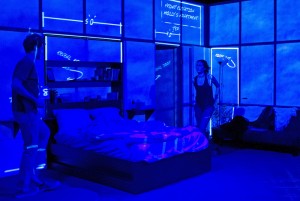 As the play’s poster puts it, “Love denies logic.” Or the heart will have what the mind won’t know. Since they can’t live in their hermetically sealed, TRON-like meta-world of derivative errors, testable hypotheses, “traveling salesman” analogies, and paradoxical dualities (I made that up but it sounds like the rest), they tentatively drop their I.Q.s in order to make something happen. After so many abstract calculations and actual vacillation, a hothouse hybrid-like romance means going with someone somewhere, not even knowing why or where.
As the play’s poster puts it, “Love denies logic.” Or the heart will have what the mind won’t know. Since they can’t live in their hermetically sealed, TRON-like meta-world of derivative errors, testable hypotheses, “traveling salesman” analogies, and paradoxical dualities (I made that up but it sounds like the rest), they tentatively drop their I.Q.s in order to make something happen. After so many abstract calculations and actual vacillation, a hothouse hybrid-like romance means going with someone somewhere, not even knowing why or where.
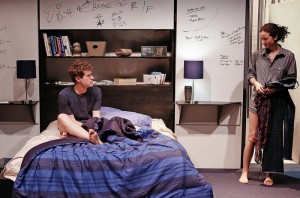 Except for an ill-advised second-act stunt that breaks the play open with a “simulated failure,” Moses has written a refreshingly original, contemporary and non-negotiable take on a very old subject. Breaking the science/sex barrier is a lot trickier than overcoming the brain/blood one. Wechsler’s consummate cast superbly negotiates Moses’ custody battle over ideas and intimacy. Geekily gesticulating in flights of rigorous analysis, Holzfeind manages to be forensically eloquent and emotionally clueless at the same wonderful time. Valada-Viars’ achingly questioning Molly is a marvel, so perceptive in one realm and obtuse in another.
Except for an ill-advised second-act stunt that breaks the play open with a “simulated failure,” Moses has written a refreshingly original, contemporary and non-negotiable take on a very old subject. Breaking the science/sex barrier is a lot trickier than overcoming the brain/blood one. Wechsler’s consummate cast superbly negotiates Moses’ custody battle over ideas and intimacy. Geekily gesticulating in flights of rigorous analysis, Holzfeind manages to be forensically eloquent and emotionally clueless at the same wonderful time. Valada-Viars’ achingly questioning Molly is a marvel, so perceptive in one realm and obtuse in another.
The title notwithstanding, it’s their incompleteness that wins us over. By play’s end, their willingness to accept uncertainty in life’s most important transformation amounts to a victory for the species. Sometimes you just “go with the flow.” Don’t worry about unrepeatable outcomes. Imprecisely phrased but painfully palpable, life is short and love is shorter.
photos by Charles Osgood
Completeness
Theater Wit, 1229 W. Belmont Ave.
scheduled to end on March 24, 2013
EXTENDED to May 4, 2013
for tickets, call 773.975.8150 or visit http://www.TheaterWit.org
for info on this and other Chicago Theater, visit http://www.TheatreinChicago.com
